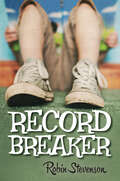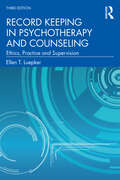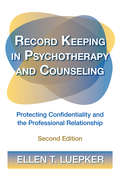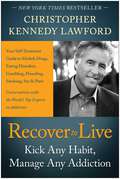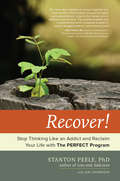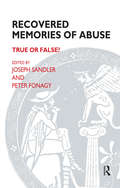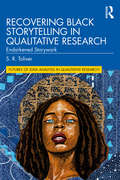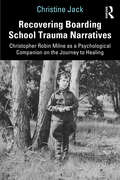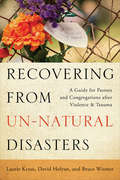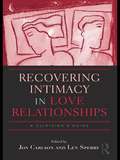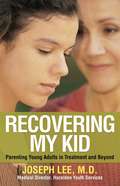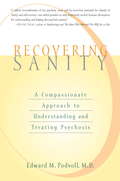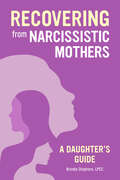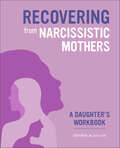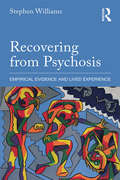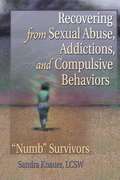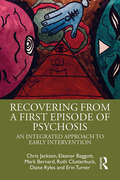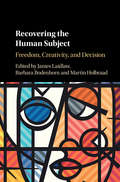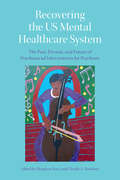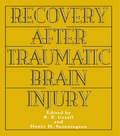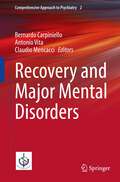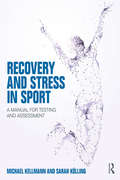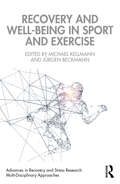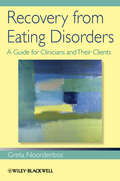- Table View
- List View
Record Breaker
by Robin StevensonIt's 1963, and Jack's family is still reeling from the SIDS death of his baby sister. Adrift in his own life, Jack is convinced that setting a world record will bring his father back to his senses and his mother back to life. But world events, including President Kennedy's assassination, threaten to overshadow any record Jack tries to beat—from sausage eating to face slapping. Nothing works, and Jack is about to give up when a new friend suggests a different approach that involves listening to, not breaking, records.
Record Keeping in Psychotherapy and Counseling: Ethics, Practice and Supervision
by Ellen T. LuepkerRecord Keeping in Psychotherapy and Counseling: Ethics, Practice and Supervision, grounded in contemporary challenges, emphasizes protecting the therapeutic and supervisory relationship through offering an essential framework for thoughtful record keeping within legal, ethical, supervisory, and clinical contexts. A reader-friendly conversational style plus compelling case examples from a variety of settings—clinic to courtroom—bring dilemmas and strategies to life. New case studies invite readers to examine principles of ethical decision-making in order to reach sound decisions, meeting a critical need in training and continuing education. New material on telehealth and electronic records, the impact of digital communications on the therapeutic relationship, and experience implementing the Health Insurance Portability and Accountability Act (HIPAA) bring this book up to date. Sample forms for readers’ use and modification are available on the publisher's website. Practitioners in all mental health disciplines, from students to seasoned clinicians, the supervisors, and teachers will continue to rely on this book for protecting themselves, their patients, and their trainees.
Record Keeping in Psychotherapy and Counseling: Protecting Confidentiality and the Professional Relationship
by Ellen T. LuepkerRecord Keeping in Psychotherapy and Counseling provides an essential framework for understanding record keeping within legal, ethical, supervisory, and clinical contexts. Compelling case examples identify dilemmas and strategies in protecting confidentiality. More than a simple reference book, this text introduces the concept of using records as therapeutic tools to strengthen the therapeutic relationship and facilitate clinical supervision. Appendices and an accompanying CD offer sample forms. A reader-friendly style makes this new edition appropriate for undergraduate and graduate students. New material on electronic records, the impact of electronic communication, and practitioners’ experiences with implementing the Health Insurance Portability and Accountability Act bring this book up to date. Everyone from students to seasoned practitioners will continue to rely on it for protecting themselves, their patients, and their trainees.
Recover to Live: Kick Any Habit, Manage Any Addiction: Your Self-Treatment Guide to Alcohol, Drugs, Eating Disorders, Gambling, Hoarding, Smoking, Sex, and Porn
by Christopher Kennedy LawfordFrom New York Times bestselling author of Symptoms of Withdrawal and Moments of Clarity Christopher Kennedy Lawford comes a book that will save lives. For most of his early life, Christopher Kennedy Lawford battled life-threatening drug and alcohol addictions. Now in recovery for more than 25 years, he works to effect change and raise global awareness of addiction in nonprofit, private, and government circles, serving as the goodwill ambassador for drug dependence treatment and care for the United Nations. For the first time, Recover to Live brings together all of the most effective self-care treatments for the seven most toxic compulsions affecting every culture on the planet today—alcohol dependence, drug dependence, eating disorders, gambling, hoarding, smoking, sex, and porn. In Recover to Live, more than 100 of the world's top experts interviewed by Lawford share their research and wisdom on how to determine if your bad habit is becoming a dependency, what treatments will work best for you, how best to help yourself or a loved one recover from addiction, and how to lead a fulfilling and productive life in recovery.
Recover!: Stop Thinking Like an Addict and Reclaim Your Life with The PERFECT Program
by Stanton Peele Ilse ThompsonFor decades you've been told that addiction is an irreversible disease, a biological force over which you have no control. That defeatist message not only is without scientific foundation, but actually prevents your overcoming addiction. Now, world-renowned addiction expert Stanton Peele demystifies addiction and offers a groundbreaking program that puts at your disposal what does work in treatment and recovery. For four decades, Dr. Peele has challenged our understanding of addiction and recovery. He has developed approaches that break the cycle of addiction and empower us to take control of our lives--including understanding that we are able to direct our own brains to change. In Recover! Dr. Peele's PERFECT Program takes you through the key concepts of mindfulness--that is, your ability to detach from your addictive experience and to see that it is not who you are--combined with the Buddhist idea of loving kindness, or self-acceptance. It's an easily grasped, yet multifaceted program that allows your true self to overcome your addictive urges. Instead of focusing on what's wrong with you, the PERFECT Program will help you discover, embrace, and build your recovery on what's already right about you. Combining the best evidence-based treatments with the mindful use of meditation, Recover! presents a life-transforming philosophy for freeing yourself from addiction forever.
Recovered Memories of Abuse: True or False? (The\psychoanalytic Monograph Ser. #No. 2)
by John Morton Peter Fonagy Mary Target Susie Orbach Valerie Sinason Arnon Bentovim Hanna Segal Christopher Cordess Judith Trowell Phil Mollon Eric Rayner Alan D. Baddeley Joseph Sandler Anne-Marie Sandler Brendan MacCarthy Lawrence WeiskrantzThese papers - from a conference with the same title - includes work by Lawrence Weiskrant (highlighting the concerns around false memories), John Morton (outlining contemporary models of memory), and Valerie Sinason (on detecting abuse in child psychotherapy). The second half presents a psychoanalytic theory of false memory syndrome, by the authors then offer a final overview.
Recovering Black Storytelling in Qualitative Research: Endarkened Storywork (Futures of Data Analysis in Qualitative Research)
by S.R. ToliverThis research-based book foregrounds Black narrative traditions and honors alternative methods of data collection, analysis, and representation. Toliver presents a semi-fictionalized narrative in an alternative science fiction setting, refusing white-centric qualitative methods and honoring the ways of the griots who were the scholars of their African nations. By utilizing Black storytelling, Afrofuturism, and womanism as an onto-epistemological tool, this book asks readers to elevate Black imaginations, uplift Black dreams, and consider how Afrofuturity is qualitative futurity. By centering Black girls, the book considers the ethical responsibility of researchers to focus upon the words of our participants, not only as a means to better understand our historic and current world, but to better situate inquiry for what the future world and future research could look like. Ultimately, this book decenters traditional, white-centered qualitative methods and utilizes Afrofuturism as an onto-epistemological tool and ethical premise. It asks researchers to consider how we move forward in data collection, data analysis, and data representation by centering how Black girls reclaim and recover the past, counter negative and elevate positive realities that exist in the present, and create new possibilities for the future. The semi-fictionalized narrative of the book highlights the intricate methodological and theoretical work that undergirds the story. It will be an important text for both new and seasoned researchers interested in social justice. Informed and anti-racist researchers will find Endarkened storywork a useful tool for educational, cultural, and social critiques now and in the future.
Recovering Boarding School Trauma Narratives: Christopher Robin Milne as a Psychological Companion on the Journey to Healing
by Christine JackRecovering Boarding School Trauma Narratives: Christopher Robin Milne as a Psychological Companion on the Journey to Healing is a unique, emotive and theorised narrative of a young girl’s experience of boarding school in Australia. Christine Jack traces its impact on the emerging identity of the child, including sexual development and emotional capacity, the transmission of trauma into adulthood and the long process of recovery. Interweaving her story with the experiences of Christopher Robin Milne, she presents her memoir as an exemplar of how narrative writing can be employed in remembering and recovering from traumatic experiences. Unique and powerfully written, Jack takes the reader on a journey into her childhood in Australian boarding school convents in the 1950s and 1960s. Comparing her experience with Christopher Robin Milne’s, she interrogates his memoirs, illustrating that boarding school trauma knows no boundaries of time and place. She investigates their emerging individuality before being sent to live an institutional life and traces their feelings of longing and loneliness as well as the impact of the abuse each endured there. As an educational historian, Jack writes in a ground-breaking way from the perspective of an insider and outsider, revealing how trauma remains in the unconscious, wielding power over the life of the adult, until the traumatic memories are recovered, emotions released and associated dysfunctional behaviour changed, restoring well-being. Engaging the lenses of history, life-span and Jungian psychology, feminist and trauma theory and boarding school trauma research, this book positions narrative writing as a way of reducing the power of trauma over the lives of survivors. Personal and accessible, this book will be essential reading for psychologists and educational historians, as well as students and academics of psychology, sociology, trauma studies, ex-boarders and those interested in the life of Christopher Robin Milne.
Recovering From Un-Natural Disasters: A Guide For Pastors And Congregations After Violence And Trauma
by Laurie Kraus David Holyan Bruce WismerRecovering from Un-Natural Disasters is a must-read handbook for pastors and church leaders of communities who could or perhaps already have experienced an un-natural disaster, such as gun violence, suicides, or sexual abuse. <P><P>Unlike natural disasters, un-natural disasters deal with the concept of sin and require a different recovery strategy. In this book, readers will explore the four phases of human-caused disaster — Devastation and Heroism, Disillusionment, Reforming, and Wisdom — and receive step-by-step suggestions to use with their faith community during the recovery process. Example worship resources, including prayers, music suggestions, and sermons that are appropriate to use during periods of trauma and recovery, are included.
Recovering Intimacy in Love Relationships: A Clinician's Guide (Routledge Series on Family Therapy and Counseling)
by Jon Carlson Len SperryThe loss of intimacy is one of the most difficult—but also one of the most common—factors in the destruction of any relationship. Recovering Intimacy in Love Relationships lays out practical, evidence-based guidelines on which clinicians can depend as they wade through the intense emotions and fragile bonds of couples in crisis. With care and sensitivity, the book's authors analyze the increasingly complex context in which the cycle of intimacy develops, wanes, and recovers. The chapters delve into diverse populations' attitudes toward intimacy and provide an entire section on cultural, gender and religious issues. Clinicians looking for a research-based, practical take on the many facets of intimacy in the twenty-first century need look no further than this book.
Recovering My Kid: Parenting Young Adults in Treatment and Beyond
by Joseph LeeNational expert Dr. Joseph Lee explains the nature of youth addiction and treatment, and how families can create a safe and supportive environment for their loved ones during treatment and throughout their recovery.National expert Dr. Joseph Lee explains the nature of youth addiction and treatment, and how families can create a safe and supportive environment for their loved ones during treatment and throughout recovery.Raising a child is tough as it is, but when your kid becomes addicted to alcohol or other drugs, it can feel as if you’re living a nightmare. You’re not alone. In Recovering My Kid, Dr. Joseph Lee, a leading youth addiction specialist, takes worried, confused, and angry parents by the hand and addresses their most pressing questions and fears: What is addiction? What happens when my child returns home from treatment? How can my family support his or her recovery? What if my child relapses? How can my family get well again?Getting your child and your family well again requires the support and understanding of the whole family, even if feelings and trust were damaged. In his engaging and straightforward style, Lee explains the difficult concepts of addiction, treatment, and recovery in a way parents and families can understand and gives them concrete strategies they can put into practice.This book will help family members begin to understand what their loved one is going through and how they can help the addict adjust to a clean-and-sober life while still taking care of themselves.
Recovering Sanity: A Compassionate Approach to Understanding and Treating Pyschosis
by E PodvollRecovering Sanity is a compassionately written examination of the experience of psychosis and related mental illnesses. By presenting four in-depth profiles of illness and recovery, Dr. Edward Podvoll reveals the brilliance and chaos of the psychotic mind and demonstrates its potential for recovery outside of traditional institutional settings. Dr. Podvoll counters the conventional thinking that the millions of Americans suffering from psychosis can never fully recover. He offers a bold new approach to treatment that involves home care with a specially trained team of practitioners. Using "basic attendance," a treatment technique inspired by the author's study of Buddhist psychology, healthcare professionals can use the tools of compassion and awareness to help patients recover their underlying sanity. Originally published as The Seduction of Madness, this reissue includes new introductory material and two new appendices.
Recovering from Genocidal Trauma
by Myra GiberovitchSince the Second World War people have become aware of the trauma associated with genocide and other crimes against humanity. Today, assisting mass atrocity survivors, especially as they age, poses a serious challenge for service providers around the world.Recovering from Genocidal Trauma is a comprehensive guide to understanding Holocaust survivors and responding to their needs. In it, Myra Giberovitch documents her twenty-five years of working with Holocaust survivors as a professional social worker, researcher, educator, community leader, and daughter of Auschwitz survivors.With copious personal and practical examples, this book lays out a strengths-based practice philosophy that guides the reader in how to understand the survivor experience, develop service models and programs, and employ individual and group interventions to empower survivors. This book is essential for anyone who studies, interacts, lives, or works with survivors of mass atrocity.
Recovering from Narcissistic Mothers: A Daughter's Guide
by Brenda Stephens LPCCValidation, compassion, and guidance for relationships with narcissistic mothers As the daughter of a mother with Narcissistic Personality Disorder (NPD), it may have been difficult to receive the validation and nurturing needed to recognize your value—but there's a road to recovery. Recovering from Narcissistic Mothers is filled with guidance and evidence-based strategies for recognizing what narcissistic abuse is, understanding its effect on your life and core identity, and establishing healthy relationships moving forward. Learn how to navigate communication to protect yourself from the manipulation you've experienced. Discover tools for processing your emotions, creating and maintaining boundaries, breaking the cycle of narcissistic abuse, and taking care of yourself. You are not alone! Recovering from Narcissistic Mothers includes: An introduction to NPD—Gain a deeper understanding of what NPD is, what causes it, how to identify it, and the different ways in which it manifests. The mother-daughter dynamic—Explore the dynamic between daughters and narcissistic mothers, including common relationship traits like role reversal, codependency, attachment, and enabling. Real-life experiences—Read others' experiences with narcissistic mothers, including recovery, self-care, and moving forward. Reclaim your identity and thrive with practical tools and guidance for daughters of narcissistic mothers.
Recovering from Narcissistic Mothers: A Daughter's Workbook
by Ellen BirosBegin to heal and recover from your narcissistic mother As the daughter of a mother with narcissistic personality disorder (NPD), healing from childhood narcissistic abuse begins by understanding what happened to you and how it affects your life as an adult. This workbook helps you process these difficult emotions and experiences so you can recover from trauma and break the cycle of narcissistic abuse.An intro to NPD—Get a clear explanation of what narcissism really is and why narcissistic people often abuse those around them.Your relationship with your mother—Understand the dynamic between daughters and narcissistic mothers, including common relationship traits like role reversal, codependency, attachment, and enabling.Tools for healing—Discover evidence-based prompts and exercises to help you work through your experiences, practice self-care, and move forward with confidence.Find validation and support in this compassionate workbook for daughters of narcissistic mothers.
Recovering from Psychosis: Empirical Evidence and Lived Experience
by Stephen WilliamsThe use of first-hand service user accounts of mental illness is still limited in the professional literature available. This is, however, beginning to change, with a new 'recovery' focus in mental health services meaning that the voices of service users are finally being heard. Recovering from Psychosis: Empirical Evidence and Lived Experience synthesises a narrative approach alongside an evidence-based review of current treatment by including Stephen Williams' own personal experience as it relates to psychosis, recovery and treatment. A mental health professional himself, the author's account of his own recovery from severe mental health difficulties, without sustained intervention, challenges the orthodoxy of representation of service users in mental health. Recovering from Psychosis critically explores and reviews the current state of the art of research and knowledge about the nature and treatment of psychosis. Working simultaneously from empirical, lived experience and philosophical perspectives, Stephen Williams: Evaluates political and power related issues in professional understanding, knowledge-creation and treatment of people with psychosis; Introduces the current 'recovery movement', unpacking its origins and implications for the future development of 'recovery oriented services'; Reviews, summarizes and critiques the current state of 'recovery' research, looking at the advantages and disadvantages of such an approach, examining how this is influencing the transformation of UK mental health services; Analyses the difficulties in organisational implementation of recovery approaches, summarises the most empirically robust approaches to practice, personal and service delivery measurement; Reviews current 'models' of psychosis and how various professional scientific groups explain the experience and nature of psychosis; Uses lived-experience accounts taken from the scientific literature, portraying the nature of such experiences and analysing them in the face of contemporary psychological models. Recovering from Psychosis is an essential comprehensive guide for mental health professionals, psychologists, social workers and carers, who are working with people with severe and enduring mental health difficulties diagnosed as psychosis. It addresses the practical implications of working with such difficult conditions and serves as a hopeful story of recovery for service users.
Recovering from Sexual Abuse, Addictions, and Compulsive Behaviors: “Numb” Survivors
by Carlton Munson Sandra L. KnauerExplore the connection between sexual victimization, addiction, and compulsive behaviors!This book demonstrates clearly what lengths survivors of sexual abuse will go to in attempting to avoid dealing with the pain resulting from their sexual abuse. Anyone who has been sexually abused is likely to have one of the addictions or compulsive behaviors described herein. The information in Recovering from Sexual Abuse, Addictions, and Compulsive Behaviors regarding codependency is especially useful to survivors of sexual abuse who now find themselves in abusive relationships. Survivors of abuse who have gone without treatment sometimes become either sexual perpetrators or sexual addicts and may experience many different types of psychological dysfunction. Recovering from Sexual Abuse, Addictions, and Compulsive Behaviors examines issues that survivors often have regarding: trust and friendship sexuality and sexual addiction marriage and family religious addiction as opposed to spirituality alcohol and substance abuse workaholism weight issues and eating disorders violence as the result of shame, fear, and depression caused by abuseRecovering from Sexual Abuse, Addictions, and Compulsive Behaviors is more than a litany of the problems that survivors face. This valuable work will show you: HOW the survivor came to employ addictive or compulsive behaviors WHY the survivor continues to employ these self-abusive behaviors despite the pain caused by the addiction WHAT the survivor needs to do to aid recovery WHERE the survivor can turn to obtain the help that is needed to recover from addictive or compulsive behaviorsWith its complete bibliography and up-to-date information on sexual abuse, addictions, and compulsive behaviors, Recovering from Sexual Abuse, Addictions, and Compulsive Behaviors will show you the full course of sexual abuse and its aftermath, bringing you from the beginnings of sexual abuse through the steps that lead to addiction and compulsion, and ultimately, recovery.
Recovering from a First Episode of Psychosis: An Integrated Approach to Early Intervention
by Mark Bernard Chris Jackson Eleanor Baggott Ruth Clutterbuck Diane Ryles Erin TurnerDespite years of research, debate and changes in mental health policy, there is still a lack of consensus as to what recovery from psychosis actually means, how it should be measured and how it may ultimately be achieved. In Recovering from a First Episode of Psychosis: An Integrated Approach to Early Intervention, it is argued that recovery from a first episode of psychosis (FEP) is comprised of three core elements: symptomatic, social and personal. Moreover, all three types of recovery need to be the target of early intervention for psychosis programmes (EIP) which provide evidence-based, integrated, bio-psychosocial interventions delivered in the context of a value base offering hope, empowerment and a youth-focused approach.Over the 12 chapters in the book, the authors, all experienced clinicians and researchers from multi-professional backgrounds, demonstrate that long-term recovery needs to replace short term remission as the key target of early psychosis services and that, to achieve this, we need a change in the way we deliver EIP: one that takes account of the different stages of psychosis and the ‘bespoke’ targeting of integrated medical, psychological and social treatments during the ‘critical period’. Illustrated with a wealth of clinical examples, this book will be of great interest to clinical psychologists, psychiatrists, psychiatric nurses and other associated mental health professionals.
Recovering the Human Subject: Freedom, Creativity and Decision
by James Laidlaw Martin Holbraad Barbara BodenhornThis volume responds to the often-proclaimed 'death of the subject' in post-structuralist theorizing, and to calls from across the social sciences for 'post-humanist' alternatives to liberal humanism in a distinctively anthropological manner. It asks: can we use the intellectual resources developed in those approaches and debates to reconstruct a new account of how individual human subjects are contingently put together in diverse historical and ethnographic contexts? Anthropologists know that the people they work with think in terms of particular, distinctive, individual human personalities, and that in times of change and crisis these individuals matter crucially to how things turn out. The volume features a classic essay by Caroline Humphrey, 'Reassembling individual subjects', that provides a focus for the debate, and it brings together a distinguished collection of essays, which exhibit a range of theoretical approaches and rich and varied ethnography.
Recovering the US Mental Healthcare System: The Past, Present, and Future of Psychosocial Interventions for Psychosis
by Meaghan Stacy Charlie A. DavidsonDecades of research show that psychosocial treatments are effective for psychosis, yet they remain unimplemented as the American healthcare system relies primarily on pharmacological solutions instead. This book reviews the history and current state of research to provide a more nuanced understanding of the evidence for and barriers to psychosocial care for psychosis. It addresses a wide range of mental health research and multi-professional practice domains from historical, personal, societal, professional, and systems perspectives. The varied perspectives presented illustrate factors that limit support for recovery in SMI and psychosis as well as real hope for recovering the US mental healthcare system. With contributions of experts by training and by experience, this book represents an essential resource for students, practitioners and researchers.
Recovery After Traumatic Brain Injury (Institute for Research in Behavioral Neuroscience Series)
by Henry H. Stonnington B. P. UzzellEmotions, behaviors, thoughts, creations, planning, daily physical activities, and routines are programmed within our brains. To acquire these capacities, the brain takes time to fully develop--a process that may take the first 20 years of life. Disruptions of the brain involving neurons, axons, dendrites, synapses, neurotransmitters or brain infrastructure produce profound changes in development and functions of the one organ that makes us unique. To understand the functions and development of the brain is difficult enough, but to reverse the consequences of trauma and repair the damage is even more challenging. To meet this challenge and increase understanding, a host of disciplines working and communicating together are required. The International Association for the Study of Traumatic Brain Injury tried to correct this limitation during its meetings of international clinicians, researchers, and scientists from many fields. It was felt that many of the outstanding thoughts and ideas from the participants' most recent meeting and from others working in the field of traumatic brain injury (TBI) should be shared. This book was conceived not as proceedings of the conference, but as a collection of knowledge for those working in the acute and chronic recovery aspects of head injury. This book reflects the importance of the team approach to patients with TBI. The chapter authors come from a diverse array of disciplines--basic science, neurosurgery, neurology, radiology, psychology, neuropsychology, and legal, consumer, and speech/language science. Their contributions provide the most current research and the latest ways of managing a variety of aspects of TBI.
Recovery and Major Mental Disorders (Comprehensive Approach to Psychiatry #2)
by Antonio Vita Bernardo Carpiniello Claudio MencacciThe book provides a clear and comprehensive description of both personal and clinical recovery in severe mental disorders, including schizophrenia and related disorders, and mood disorders such as major depression and bipolar disorders. Divided into two main parts: recovery in schizophrenia and related disorders, and recovery in mood disorders, it offers a broad overview of the factors associated with better or worse outcomes in terms of recovery, as well as the rates (how many people affected by mental disorders may gain recovery), and the time course (how long people affected by mental disorders take to recover) of recovery. It also discusses in detail the pharmacological and psychosocial interventions that can be considered recovery-oriented. Covering the main aspects of recovery in major mental disorders, the book is intended for professionals, scholars, students and anyone interested in mental health.
Recovery and Stress in Sport: A Manual for Testing and Assessment
by Michael Kellmann Sarah KöllingBalancing training, stress, and recovery is essential for achieving optimal performance. The performance of professional athletes can be severely compromised by overtraining, injuries, prolonged periods of competition, or even life events outside their sporting lives. The current recovery-stress state depends on preceding stress and recovery activities, but through simultaneous assessment of stress and recovery, a differentiated picture can be provided. This manual includes two measurement instruments to gauge individual recovery, enabling both athletes and coaches to better understand the often-unconscious processes that impinge upon peak performance, and to monitor the physical, mental, emotional, mental, and overall recovery-stress state before and after training. The Acute Recovery and Stress Scale (ARSS) and the Short Recovery and Stress Scale (SRSS) are instruments that systematically enlighten the recovery-stress states of athletes. Through utilization of the ARSS and the SRSS, athletes and coaches can better understand the importance of daily activities, including how they can relate to stress/recovery and the direct impact on athletic performance. In addition to the instruments themselves, both of which are simple and easy to use, the manual also discusses their development, their basis in theory, and case studies showcasing their usage. The ARSS and the SRSS provide important information regarding the current recovery-stress state during the process of training, and are essential tools for coaches, sport scientists, sport psychologists, and athletes alike.
Recovery and Well-being in Sport and Exercise: Interdisciplinary Insights
by Michael Kellmann Jürgen BeckmannBringing together the world’s leading experts, this multi-disciplinary collection examines both the psychological and physiological dimensions to recovery from sport. Featuring chapters on overtraining, sleep, the relationship to injury, as well as the role of stress, this volume illustrates how performance, both as an individual and within of a team, can be better managed through understanding the recovery process. It also covers the impact of travel on performance, as well as guidance on measurement and training. Based upon the contemporary models of recovery and performance in different scientific disciplines such as medicine, neuroscience, psychology, and sport science, expert contributors also explore implications for applied and strategic interventions to retain and stabilize performance ability. This is a must-have resource for students and scholars across the sports sciences as well as any coach interested in the latest research. This book in this new series is essentially a new edition of the book Sports, Recovery, and Performance under a new title, Recovery and Well-being in Sport and Exercise. Even though there is a large overlap between the 2018 book and this first book of the series, several modifications have been made: some chapters were omitted, new chapters were added, and some chapters have been substantially updated and revised.
Recovery from Eating Disorders
by Greta NoordenbosWith a uniquely perspective on the key factors in recovery from eating disorders, this practical guide for patients and clinicians draws from relevant, real-life case studies.Focuses on real-life recovery strategies that involve motivational factors, physical and psychological health, and issues such as self-esteem, body attitude, emotion regulation and social relationships.Draws on extensive qualitative research with more than 80 former sufferersOffers experience-based guidance for professionals assisting clients in their recovery process
